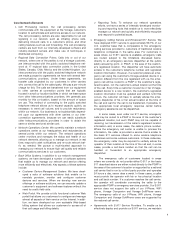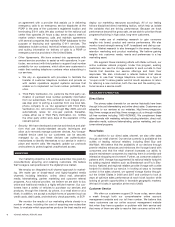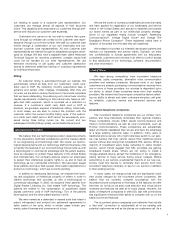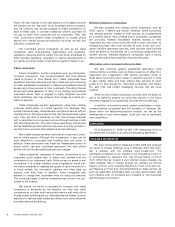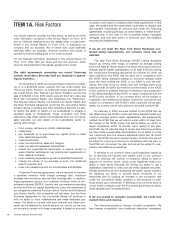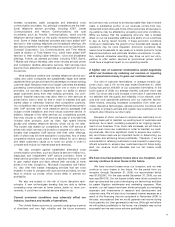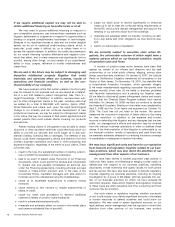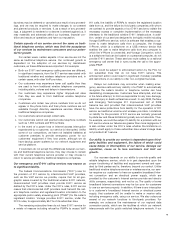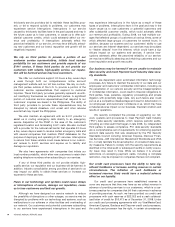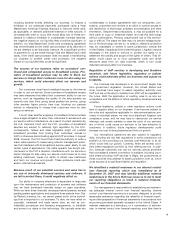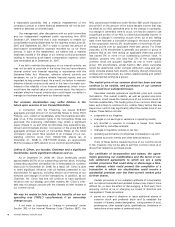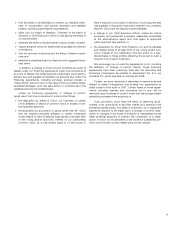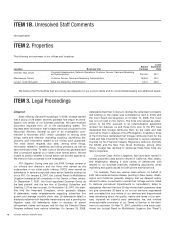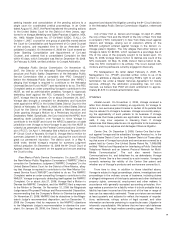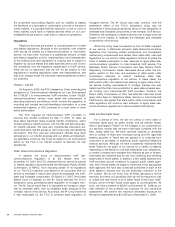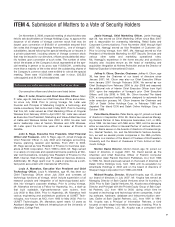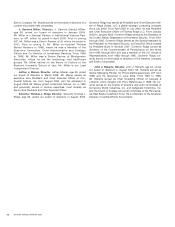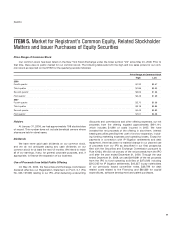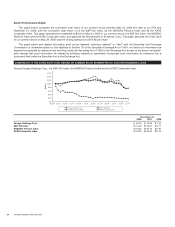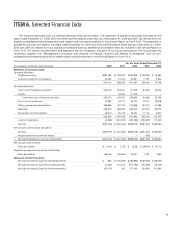Vonage 2008 Annual Report Download - page 23
Download and view the complete annual report
Please find page 23 of the 2008 Vonage annual report below. You can navigate through the pages in the report by either clicking on the pages listed below, or by using the keyword search tool below to find specific information within the annual report.including adverse events a
ff
ecting our business, to impose
a
h
oldback of our advanced payments purchased using a Visa
/
M
aster
C
ard, American Express, Barcla
y
s or Discover credit card,
as applicable, or demand additional reserves or other securit
y
.I
f
circumstances were to occur that would allow any of these pro
-
cessors to
i
n
i
t
i
ate a
h
o
ldb
ac
k
or cons
id
era
bl
y
i
ncrease reserves,
t
he ne
g
ative impact on our liquidity likely would be si
g
ni
f
icant. I
n
addition, our Visa
/
Master
C
ard credit card processing agreemen
t
m
ay be terminated by the credit card processor at its discretion i
f
we are deemed to be
f
inancially insecure. As a si
g
ni
f
icant portion
of payments to us are made through Visa and MasterCard credit
cards, if the credit card processor does not assist in transitionin
g
our business to another credit card processor, the ne
g
ativ
e
impact on our liquidity likely would be signi
f
icant.
The success o
f
our business relies on customers’ con-
t
i
nue
d
an
d
un
i
mpe
d
e
d
access to
b
roa
db
an
d
serv
i
ce.
P
ro
-
viders of broadband services ma
y
be able to block our
services or char
g
e their customers more for also usin
g
our
services, which could adversely a
ff
ect our revenue and
growt
h.
O
ur customers must have broadband access to the Interne
t
i
n order to use our service. Some providers of broadband acces
s
m
ay take measures that affect their customers’ ability to use our
s
ervice, such as de
g
radin
g
the quality of the data packets w
e
t
ransmit over their lines, giving those packets low priority, givin
g
ot
h
er pac
k
ets
hi
g
h
er pr
i
or
i
ty t
h
an ours,
bl
oc
ki
ng our pac
k
et
s
entirely or attemptin
g
to char
g
e their customers more for also
u
sing our services
.
I
t is not clear whether suppliers o
f
broadband Internet acces
s
h
ave a
l
ega
l
o
bli
gat
i
on to a
ll
ow t
h
e
i
r customers to access an
d
use
our service without interference. As a result of recent decisions b
y
t
he U.S. Supreme Court and the FCC, providers of broadband
s
ervices are subject to relatively light regulation by the F
CC
.
C
onsequently, federal and state re
g
ulators mi
g
ht not prohibi
t
b
roadband providers
f
rom limitin
g
their customers’ access t
o
VoIP or otherwise discriminating against VoIP providers. In Augus
t
2008, however, the F
CC
found that it had the authority to order
a
m
ajor cable operator to cease usin
g
network mana
g
ement practi-
ces that interfered with its broadband service users’ ability to us
e
certain types of applications. The cable operator has sou
g
ht judi-
cial review of the FCC’s decision. Interference with our service or
h
igher charges
f
or also using our service could cause us to los
e
ex
i
st
i
n
g
customers,
i
mpa
i
r our a
bili
ty to attract new customer
s
and harm our revenue and
g
rowth. These problems could also
arise in international markets
.
Because much o
f
our potential success and value lies i
n
our use o
f
internally developed systems and so
f
tware, i
f
we fail to protect them, it could ne
g
atively affect us
.
O
ur ability to compete effectively is dependent in lar
g
e part
u
pon the maintenance and protection o
f
s
y
stems and so
f
tware
t
hat we have developed internally based on open standards.
Whil
ewe
h
ave t
h
ree
i
nterna
ll
y
d
eve
l
ope
di
ssue
d
patents, severa
l
p
endin
g
patent applications and acquired three patents
f
rom Di
g
i
-
t
al Packet Licensing, Inc., we cannot patent much o
f
the technol
-
o
g
yt
h
at
i
s
i
mportant to our
b
us
i
ness.
T
o
d
ate, we
h
ave re
li
e
d
on
copyri
g
ht, trademark and trade secret laws, as well as con-
f
identiality procedures and licensing arrangements, to establish
an
d
protect our r
igh
ts to t
hi
s tec
h
no
l
o
g
y.
W
e typ
i
ca
ll
y enter
i
nt
o
c
on
f
identiality or license a
g
reements with our employees, con-
s
ultants
,
customers and vendors in an e
ff
ort to control access t
o
a
nd distribution of technolo
g
y, software, documentation and othe
r
i
n
f
ormation. Despite these precautions, it ma
y
be possible
f
or a
third party to copy or otherwise obtain and use this technology
w
ithout authorization. Policin
g
unauthorized use of this technol-
og
yisdi
ff
icult. The steps we take may not prevent misappropria-
tion o
f
the technology we rely on. In addition, e
ff
ective protectio
n
may
b
e unava
il
a
bl
eor
li
m
i
te
di
n some
j
ur
i
s
di
ct
i
ons outs
id
et
he
U
nited States, Canada and the United Kin
g
dom. Liti
g
ation may b
e
necessary in the
f
uture to en
f
orce or protect our rights or t
o
d
etermine the validity and scope of the ri
g
hts of others. That liti-
g
at
i
on cou
ld
cause us to
i
ncur su
b
stant
i
a
l
costs an
ddi
vert
resources away
f
rom our daily business, which in turn coul
d
materially adversely affect our business.
R
egulation o
f
VoIP services is developing and there
f
or
e
u
ncertain, and
f
uture legislative, regulatory or judicial
a
ctions could adversely a
ff
ect our business and expose us
t
o liabilit
y.
O
ur business has developed in an environment lar
g
ely free
from government regulation. However, the United States and
o
t
h
er countr
i
es
h
ave
b
e
g
un to assert re
g
u
l
atory aut
h
or
i
ty ove
r
V
oIP and are continuin
g
to evaluate how VoIP will be re
g
ulated in
the
f
uture. Both the application o
f
existing rules to us and ou
r
c
ompetitors and the effects of future re
g
ulatory developments are
u
n
ce
rt
a
in
.
F
uture
l
eg
i
s
l
at
i
ve,
j
u
di
c
i
a
l
or ot
h
er regu
l
atory act
i
ons cou
ld
have a ne
g
ative effect on our business. If we become subject t
o
the rules and re
g
ulations applicable to telecommunications pro-
v
iders in individual states, we may incur significant litigation and
c
omp
li
ance costs, an
d
we may
h
ave to restructure our serv
i
c
e
off
erin
g
s, exit certain markets or raise the price o
f
our services,
a
ny o
f
which could cause our services to be less attractive to
c
ustomers. In addition, future re
g
ulatory developments coul
d
i
ncrease our cost o
f
doin
g
business and limit our
g
rowth
.
O
ur international operations are also subject to regulator
y
r
i
s
k
s,
i
nc
l
u
di
n
g
t
h
er
i
s
k
t
h
at re
g
u
l
at
i
ons
i
n some
j
ur
i
s
di
ct
i
ons w
ill
p
rohibit us
f
rom providing our services cost-e
ff
ectively or at all
,
w
hich could limit our growth.
C
urrently, there are several coun-
tries where re
g
ulations prohibit us from offerin
g
service. In addi-
tion, because customers can use our services almost an
y
where
t
h
at a
b
roa
db
an
dI
nternet connect
i
on
i
s ava
il
a
bl
e,
i
nc
l
u
di
ng coun-
tries where providin
g
VoIP services is ille
g
al, the
g
overnments of
those countries ma
y
attempt to assert jurisdiction over us, which
c
ould expose us to significant liability and regulation
.
W
e identi
f
ied a material weakness in our internal control
o
ver
f
inancial reporting which was remediated as o
f
D
ecember 31, 2007 and ma
y
identif
y
additional material
w
eaknesses in the future that ma
y
cause us to fail to mee
t
o
ur report
i
ng o
bli
gat
i
ons or resu
l
t
i
n mater
i
a
l
m
i
sstate-
m
ents o
f
our
f
inancial statements.
O
ur management is responsible for establishing and maintain-
i
n
g
adequate internal control over financial reportin
g
. Interna
l
c
ontrol over
f
inancial reportin
g
is a process desi
g
ned to provid
e
reasonable assurance regarding the reliability o
ff
inancial report-
i
n
g
and the preparation of financial statements in accordance wit
h
a
ccountin
g
principles
g
enerally accepted in the United States. A
material weakness is a de
f
iciency, or a combination o
f
de
f
icien-
c
ies, in internal control over financial reportin
g
, such that there i
s
15


